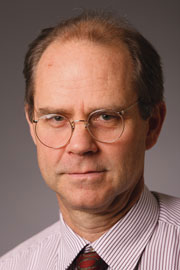
For Release: July 26, 2011
Contact:
David Corriveau 603-653-1978 david.a.corriveau@hitchcock.org
Follow on Twitter: @DartmouthMed
Stommel to present research at workshop on triggers to neurological disorders
BRUNSWICK, Maine—Dartmouth neurologist Elijah Stommel, MD, PhD, will co-lead a workshop at Bowdoin College next week on mounting evidence that environmental factors play a major role in triggering neurodegenerative disorders like Amyotrophic Lateral Sclerosis (ALS) and Alzheimer's disease.
During the August 4-6 gathering, specialists in medicine, neurology, toxicology, epidemiology, ecology, oceanography and limnology will discuss the links between conditions such as ALS - also known as Lou Gehrig's disease - and blooms of cyanobacteria in marine and freshwater environments. In collaboration with other specialists around the country, Stommel and researchers at Dartmouth-Hitchcock Medical Center (DHMC) have been studying clusters of ALS cases in New Hampshire, Maine and Vermont to determine whether and how the blooms unleash a neurotoxin found in the brains of patients with ALS.
"If the cyanobacterial toxin BMAA is a trigger for neuro-degeneration, the implications are tremendous, both from a preventative and treatment perspective," says Stommel, an associate professor of neurology at Dartmouth Medical School (DMS).
Paul Alan Cox, PhD, director of the Institute of Ethnomedicine in Wyoming, points to DMS studies of clusters of ALS patients living near lakes with cyanobacterial blooms as "an important piece of the puzzle" in the search for proof of the links. Cox, who is focusing his research on discovering new therapies for ALS and Alzheimer's disease, will present the history of ALS and the cyanobacteria connection.
Cyanobacteria are proliferating worldwide, threatening the use and sustainability of freshwater resources, according to Hans Paerl, PhD, of the Institute of Marine Sciences at the University of North Carolina.
"These blooms are symptomatic of human nutrient over-enrichment and are taking advantage of regional and global climatic change, including warming and altered hydrology," Paerl says. "Effective future management approaches must incorporate the effects of human-induced nutrients within the context of a changing climate."
For more information on the workshop, click here or call 207-725-3396.
For interviews with Stommel, Cox, or Paerl, see contact information below:
Elijah Stommel
603-650-7916
elijah.w.stommel@hitchcock.org
Paul Cox
Assistant Marilyn Asay
801-375-6214
mkasay@comcast.net
Hans Paerl
252-726-6841, ext. 133
Hans_Paerl@unc.edu
-DMS-
